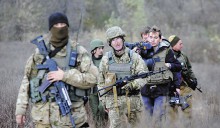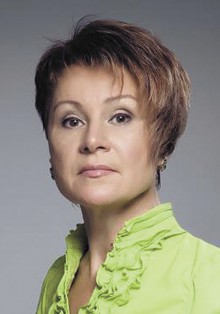On June 27-29, the town of Sviatohirsk, Donetsk oblast, will host the 3rd Donbas Media Forum, themed “The Donbas in the Media: from Populism to the Facts.” As announced by organizers, the forum will host a discussion of political populism in opposition to the standards of journalism, a talk about ways to improve the efficiency of media work in the Donbas (management, fundraising, new technologies, diversity of content), and a debate on conflict-sensitive journalism in wartime. The Donbas Media Forum was first held in Kyiv two years ago, then in Mariupol past year, and this year’s gathering will be held in Sviatohirsk. The event, which focuses on discussing main issues faced by journalists covering the life of the Donbas and the war as well as the global media space problems, is organized by the Pylyp Orlyk Institute for Democracy, Donetsk Institute of Information, and the Donetsk Press Club. The admission to the event is free. A key requirement for those wishing to participate is to argue for the importance of acquired knowledge and skills related to suggested topics for one’s professional activity.
On the eve of the Forum, The Day met with Ukrainian journalist, media expert, executive director of the Pylyp Orlyk Institute for Democracy Svitlana Yeremenko to get detailed information about the objectives set by the organizers of the event and raise the controversial issue of the professional standards in wartime.
This year, the Donbas Media Forum will be held for the third time. What will be the main message of the event for our Ukrainian colleagues? Who will be its key speakers?
“Yes, the first Donbas Media Forum was held in Kyiv in 2015, the second was held in Mariupol past year, and the third is scheduled for late June, to be hosted by the picturesque town of Sviatohirsk, Donetsk oblast.
“The theme of this year’s forum is “The Donbas in the Media: from Populism to the Facts.” More specifically, we will try to convey several messages. Firstly, we would like to get Ukrainian journalists and public realize that Russia continues its undeclared war against Ukraine, so citizens of Ukraine need objective information about all the problems connected with it. Secondly, journalists have to work now in a post-truth and populist age, when major newsmakers proclaim the ‘truth’ which they find useful to them. But despite this, media have to be objective and accountable to society. We also want to once again raise the issue of ‘hate speech,’ to convince reporters and editors that one may not over-generalize and accuse all Luhansk and Donetsk residents of separatist sentiments and collaboration. After all, many patriots remain in the occupied territories that are waiting for the Ukrainian military to liberate them. It should be understood that by humiliating and discriminating against internally displaced persons, journalists are playing into the hands of Russian propaganda.
“Through trainings and workshops at the Forum, we aim to increase the professional level of journalists, give them new knowledge, and help them to master new technologies of information dissemination. As a result, we hope to increase the competitiveness of the media, especially in the liberated territories of Donetsk and Luhansk regions, and improve the quality of content.
“For the third year running, we are faced with the fact that foreign speakers – the experts and journalists whom we invite – cannot come, because their organizations’ safety policies prohibit even traveling to the Ukrainian-controlled territory in eastern Ukraine. So we are very grateful to those who still have the courage to come. This time the Forum will be attended by Nicolas Ebnoether, who is a project manager at the Office of the OSCE Representative on Freedom of the Media (Vienna, Austria); Jeta Xharra, the founder of the Balkan Investigative Reporting Network (BIRN), host of the Kosovo Life TV show (Pristina, Kosovo); Gabrielle Kaprielian Cunin, a program manager of the organization Fondation Hirondelle (Switzerland); Anastasia Taylor-Lind, a press photographer who cooperates with National Geographic, The New Yorker, TIME, The Sunday Times Magazine, and The Telegraph Magazine.
“We especially want to hear from Donetsk and Luhansk journalists who were internally displaced, but kept their media outlets alive and continue to engage in journalism, such as journalist of Radio Liberty Andrii Dikhtiarenko and chief manager of the Luhansk Regional Branch of the Public TV of Ukraine Andrii Shapovalov. It will be interesting to hear from Tetiana Yakubovych, who works for Radio Liberty’s project “Donbas. Realities.”
“Among other participants of our discussions, I would like to name Yurii Kostiuchenko, who serves as executive secretary of the System Analysis Committee of the National Academy of Sciences of Ukraine; Olena Sadovnyk, a project coordinator at the Thomson Foundation; Yevhen Hlibovytskyi, a partner at the consulting company Pro.Mova; Oleksii Haran, the research director of the Ilko Kucheriv Democratic Initiatives Foundation, Doctor of Sciences in History, Professor of Political Science at the National University of Kyiv Mohyla Academy.
“Trainings and workshops will be held by social psychologist Oleh Pokalchuk; media lawyer Liudmyla Pankratova will speak about copyright; media expert of the Pylyp Orlyk Institute for Democracy Natalia Steblyna will explain how to stick to journalism standards under the conditions of rampant populism, post-truth and pressure from various sides; Serhii Polezhaka and Oleksii Furman will describe new digital media technologies and how to employ them; well-known investigative journalist Dmytro Hnap will share his experience... In short, the program is well thought-out and very intense. We hope everyone will find the most important and interesting event for oneself.”
What do you think Ukrainian journalism should look like in general in wartime?
“It should be truthful, in the first place. People need accurate and balanced information. Especially in wartime. Through regional media monitoring, conducted by our expert team of the Pylyp Orlyk Institute for Democracy in eight regions of Ukraine, we see that, unfortunately, journalists do not always disseminate objective information. Some media keep silent altogether on issues of the war, veterans, internally displaced persons. Others, like Rinat Akhmetov’s newspaper Donetskie Novosti, do raise these issues, but do not say who made it all happen. That is, they do not call Russia the occupying power. Even worse, in the fourth year of the war (!), some media conduct anti-Ukrainian editorial policy, disseminate pro-Russian messages. As examples, I can point out to the Odesa website Timer and the Zhytomyr newspaper Ekho. We also observe some Ukrainian journalists playing into the hands of Russian propaganda by reprinting and distributing fakes, for example about internally displaced persons. Some media professionals ask the question: what is more important, citizenship and patriotism or compliance with the professional standards? I do not see any contradiction. How can a journalist be not a patriot of their country, especially when there is a war? I think that a journalist’s patriotism manifests itself precisely through their efforts to objectively inform the public on all events and developments that occur in the country.”
Manipulations and mythologized notions regarding the problems of eastern Ukraine are often due to a lack of accurate information. Is Ukraine doing enough, in your opinion, in particular through the Ministry of Information Policy, to break the information blockade of the occupied territories?
“Definitely not! Over three years, the Ministry of Information Policy and other institutions responsible for information security have done very little. The Karachun Hill TV tower has been rebuilt, but its broadcasts do not reach the occupied territories. Meanwhile, Russian TV channels are well received not only in the occupied territories of Donetsk and Luhansk regions, but also in the liberated territories, the ‘gray zone,’ in Zaporizhia, Kherson, Kharkiv regions and even in border areas of Chernihiv and Sumy regions. It is worst of all in the frontline areas where residents do not receive any information whatsoever from the rest of Ukraine. For three years, people have been under strong pressure of Russian propaganda, and it is very dangerous! Even quite adequate people change their views. The government’s work is being performed by independent media: the Ostrov website, the Public Television and Public Radio, the Novosti Donbasa website and the Public Television of the Donbas. The principal nationwide TV channels broadcast mostly frontline reports, but we know almost nothing about everyday life in the occupied and even Ukraine-controlled areas. Only the Channel 5’s Polilogue show seriously deals with the issue of internally displaced persons. We still do not have a strong international broadcasting department. Over three years, we have not learned to work proactively, to take counteractions in the information war. This will also be discussed at the Forum.”








